Former foes join forces to target the government
Also in this edition: Growing signs of discontent in the judiciary over palace interference, and Thai journalists are silent as the regime bullies their colleague
Welcome to the latest Secret Siam weekly news roundup! If you are interested in analysis of the latest developments in Thailand, please subscribe to receive the newsletter in your inbox every week.
If you missed it over the weekend, I published a history of the Thai military’s terrible treatment of refugees over the decades, as a new crisis brews on the border with Myanmar.
Jatuporn back in the game
Controversial core Red Shirt leader Jatuporn Prompan has made a dramatic return to the frontlines of Thai political conflict with the launch of a new protest group seeking to topple Prayut Chan-ocha and reform the constitution. It’s not yet clear whether his intervention will make a significant difference to the fortunes of the democracy movement but it heralds the emergence of a broader coalition hoping to bring down the government.
Jatuporn’s new group, which is called Samakkhi Prachachon, or United People, has intriguingly been joined by several right-wing nationalist figures previously associated with the Yellow Shirts. One of them is Veera Somkwamkid, who formerly headed the ultranationalist Thai Patriots Network and spent more than three years in jail in Cambodia after illegally crossing the border in 2010 in a provocative protest over disputed territory. Another is Piphob Thongchai, who was a core leader of the so-called People’s Alliance for Democracy. Jatuporn, Veera and Piphob are co-leaders of the new movement along with Adul Khieuboriboon who heads a group of relatives of the victims of the “Black May” massacre of protesters in 1992.
Several hundred people gathered yesterday for the group’s first rally at the Black May 1992 memorial monument in Santiporn Park on Ratchadamnoen Avenue. The link to Black May is significant because many of the leaders of the duelling Red Shirt and Yellow Shirt movements of the 21st century fought together on the same side in 1992 against the military government of Suchinda Krapraiyoon. Speaking to Thai Enquirer last week, Jatuporn said:
Similar to protests in May 1992, there will be no sides and it will be about the people uniting to fight a tyrant.
General Prayut is not keeping his promise of amending the carter. If we do nothing, he will remain in power and the country will be in this dire condition for at least another six years. Because the junta-appointed senators will continue to exist at the next election if the charter is not amended.
The crowd on Sunday was mainly made up of Red Shirts but they listened enthusiastically to the speeches of Veera and Piphob too. All speakers stressed the importance of putting aside the differences of the past to unite in the fight to bring down the government. The crowd chanted slogans denouncing Prayut, and held their hands aloft in the three-finger democracy salute.
Jatuporn’s return to the political arena has reignited speculation that his old boss Thaksin Shinawatra is pulling the strings of the protest movement behind the scenes. According to royalist commentator Tulsathit Taptim:
Whatever his real motive, this return to the national spotlight suggests that someone, somewhere is going “all-in” in the high-stake power game…
The Jatuporn-works-for-Thaksin theory is based on a belief that the man in Dubai is getting more restless than ever before and has to bet all his chips now because the longer it goes, the smaller Pheu Thai may become. A collapse of the Prayut administration would give Pheu Thai another shot at government control, but it has to be now, when the opposition party is still capable of winning the most seats in a general election.
Many royalists are chronic conspiracy theorists who find it inconceivable that a mass protest movement could emerge among Thai youth demanding democracy and reform of the monarchy unless some shadowy mastermind in the background was orchestrating events. For years they have been convinced that Thaksin is behind every unwelcome development in Thailand, and even some foreign analysts have fallen prey to this paranoia. Shawn Crispin, whose sources are mostly establishment royalists, claimed last year that Thaksin was among “significant political forces hidden in the wings” manipulating the protesters, and David Hutt has made a similar argument. The brilliant political artist Kai Maew regularly mocks this attitude by placing Thaksin’s face somewhere in almost all of his cartoons, sometimes obvious but often hidden and hard to find.
But there are plenty of reasons to be sceptical that Jatuporn is acting as a political proxy for his former leader. He had a very public falling out with the Shinawatra clan in December, backing a rival candidate to the Pheu Thai nominee supported by Thaksin for the job of Chiang Mai provincial administrative organisation chief, and afterwards launched a huge number of lawsuits against people who he alleged had defamed him.
It’s also highly unlikely that Yellow Shirts like Veera and Piphob would have anything to do with the new protest group if they suspected it was a secret political vehicle for their nemesis Thaksin.
Jatuporn annoyed many in the democracy movement with comments to the House committee on national reconciliation last July warning student protesters not to criticise the monarchy because of the risk of alienating the wider public and provoking a violent backlash from the royalist elite. He argued protesters should stick to three core demands — resignation of the government, reform of the constitution, and an end to persecution of people who oppose the regime — which had wide public support:
But they must leave the monarchy untouched, otherwise their strong points will be weakened and may lead to loss of lives, as it did among UDD protesters in 2010 and student activists in 1976.
Jatuporn’s remarks were a response to the widespread emergence of banners and signs mocking and criticising Vajiralongkorn at anti-government rallies in June 2020. But most of the leaders of the protest movement concluded during 2020 that there can never be real political change in Thailand without fundamental reform of the monarchy, and criticism of the king became even more direct in the months that followed. There are stark ideological differences between youth-oriented democracy groups and the ultraroyalists now allied with Jatuporn. Student protest leaders including Benjar Apun of the United Front of Thammasat and Demonstration have said they are open to the idea of working with Jatuporn’s group but they won’t drop their demands for reform of the monarchy.
Even former allies of Jatuporn among the Red Shirts seem highly sceptical about him now. Nattawut Saikua, who was another of the three core leaders of the United Front for Democracy against Dictatorship, said last week following his release from prison that he supports the democracy protests but has no plans to join forces with Jatuporn. There are lingering suspicions among many Red Shirts that Jatuporn has become a turncoat who is betraying the movement, especially after he started calling for the UDD to be disbanded. As discussed by Saowanee Alexander in an excellent article for New Mandala last week, many Red Shirts have already been actively backing the student protests for months, long before Jatuporn belatedly declared his support.
Jatuporn has urged protesters to assemble again at the same place today and keep returning until the government resigns. It remains to be seen whether significant numbers heed his call or if the group will quickly fizzle out into insignificance. But if he manages to mobilise enough people, Jatuporn could start to be taken seriously once again as a significant player in the political game.
Judicial divisions
There is growing evidence that Thailand’s judiciary is divided, with some judges increasingly unhappy at being told what to do by the palace.
According to leaked information from a recent meeting of Supreme Court judges, court president Methinee Chalothorn was challenged by some colleagues about why protest leaders facing lèse majesté charges are being routinely denied bail. She replied that “somebody external” had ordered that bail should be refused — a coded admission that the monarchy is meddling in judicial decisions.
Palace sources say Vajiralongkorn uses former Constitutional Court president Nurak Mapraneet, who was appointed to the Privy Council last year, as an emissary to convey his instructions to the judiciary. Nurak is a loyal royalist who obediently carried out Vajiralongkorn’s orders to dissolve the Future Forward Party last year. Supreme Court president Methinee is another extreme royalist with a penchant for crawling at the feet of Vajiralongkorn even when it’s not strictly required — as she did again on March 24 at a ceremony at Ampornstan Palace.
But other judges are less pliable, and many have misgivings about royal interference. Leaks from the meeting with Methinee suggest some judges told her that if the judiciary allows meddling in its decisions the justice system will collapse, and she should face a disciplinary hearing.
Move Forward Party MP Rangsiman Rome is bravely trying to summon Methinee to testify about the issue to a hearing of the House committee on law, justice and human rights, but government legislators are trying to block the attempt.
Student activist Bunkueanun “Francis” Paothong, veteran campaigner Ekachai Hongkangwan and three others were indicted last week on trumped up charges of threatening a convoy carrying Queen Suthida last year, but were unexpectedly granted bail by Bangkok Criminal Court, in a sign that at least some judges are refusing to follow palace orders.
The five have being charged under the archaic feudal-era Article 110 of the Penal Code, which carries a sentence of 16 years to life, or even the death penalty if the queen’s life is deemed to have been threatened. The charges stem from an incident on October 14 last year when a cream-coloured stretch Rolls Royce limousine carrying Queen Suthida and Prince Dipangkorn tried to drive through a crowd of protesters outside Government House. The protesters were taken completely by surprise — police had done nothing to clear the street in advance or announce that a royal vehicle was on the way. Plentiful video evidence shows that nobody attempted to attack or block the car. According to several palace sources, the Rolls Royce was deliberately driven into the protesters to provoke a confrontation, and justify the aggressive regime crackdown that followed in subsequent days. The decision of the judge to offer bail gives a glimmer of hope that the five accused may eventually receive a fair verdict and be cleared of wrongdoing.
In a speech outside the court before discovering that he had received bail, Francis declared: “I am proud to be a part of this fight.”
Last Friday there was another unexpected decision by Bangkok Criminal Court — protest guard leader Piyarat “Toto” Chongthep was granted bail at his third attempt. He had been in jail since March 8 on charges of possessing weapons and illegal assembly. After the court’s decision, police scrambled to find a way to keep him behind bars. Instead of being released, he was driven to Prachachuen police station where he was formally arrested on more charges of lèse majesté and computer crimes relating to a protest in Kalasin province. He was then driven to Kalasin where a judge denied him bail for the new charges. The absurd events showed the desperation of the regime to keep protest leaders locked up.
In a third surprise verdict, the Administrative Court overturned a 35 billion baht fine imposed by the junta on Yingluck Shinawatra in 2016 supposedly to compensate the state for losses caused by her government’s ill-fated rice subsidy scheme. After seizing power from Yingluck in their illegal 2014 coup, the government used the threat of a harsh jail sentence to pressure her into fleeing into exile in 2017. She was later sentenced in absentia to five years in prison, but the validity of that verdict has now been thrown into question by the Administrative Court’s decision to void her fine. The court said corruption in the scheme took place at the operational, not the executive level, and so Yingluck should not be held responsible. The government plans to appeal.
But despite signs that some judges are rebelling, the regime is pressing ahead with its aggressive strategy of targeting its enemies with multiple lèse majesté and sedition charges. Most democracy movement leaders have been languishing in jail for weeks already, with Penguin “Parit” Chiwarak facing possible sentences totalling 300 years in jail, Anon Nampha 180 years and Panusaya “Rung” Sithijirawattanakul 135 years.
Penguin is now entering his fourth week of hunger strike in protest against the refusal to grant bail to leaders of the democracy movement, and Rung is also now refusing food. Announcing her decision on March 30, she told the court:
I’m only a 22-year-old student. I dream of a better society and a better future. How am I wrong in exercising my right to protest to reform politics? Many of my friends and I have been denied bail…
I am afraid. I am afraid for my friends. I told Penguin that I’m afraid he would die. But Penguin told me: “If I die, I die.”
I always think to myself: “We fight to survive. If we don’t fight, we will die.”
But if someone has to die, then let it be for the livelihood of others. If today I don’t receive bail, I will go on a hunger strike. I will start by eating just one meal a day. Then I will reduce to only water, milk, and nutrients.
May our death become the fountain of hope for society.
In another blow to the political prisoners who have been denied bail, the Corrections Department has suspended all visits to detainees from today until May 5 after more than 100 inmates and guards tested positive for the coronavirus in Narathiwat and Surat Thani provinces. This leaves the democracy movement leaders cut off from their lawyers and makes it even more outrageous that they are still being refused bail.
Meanwhile, progressive auto parts billionaire Thanathorn Juangroongruangkit was formally charged with lèse majesté last Tuesday over comments in January criticising the government’s coronavirus vaccine procurement strategy, which relies heavily on royal firm Siam Bioscience producing tens of millions of AstraZeneca doses. Speaking to reporters outside the court, Thanathorn said:
If you go back to listen to what I said in the clip, you’ll find nothing that violates Article 112. Two months have passed and you can see what I said back then was true — overreliance on a vaccine by a single company is a risk.
The total number of people charged with lèse majesté since the start of the crackdown on the democracy movement last year is now at least 91.
Journalist under fire
On the evening of March 28, during a disproportionately heavy handed operation to round up peaceful protesters near Government House, a riot policeman threatened Tokyo Shimbun journalist Kamonthip Aungsakulaporn with a gun. Last Tuesday, Thai Enquirer published a story about the incident.
Kamonthip said that as she was covering the crackdown, “a group of riot police shouted at me to stop filming” and she asked why she was not being allowed to cover what was happening and why they were using guns:
I stopped recording and got onto the sidewalk, and one of the police officers came in to talk to me. The same police that was in the video with the gun came in very close and I felt something hard on my shoulder. When I looked I saw the muzzle of the gun pointing at me. The police that came to talk to me separated us and was apologizing and saying nothing happened.
She said she had been wearing a jacket, neck tag and armband identifying her as a journalist.
A few hours after the Thai Enquirer story was published, Prayut aggressively criticised Kamonthip during a news conference at Government House, berating her for sitting with her legs crossed.
The following day, government spokesperson Natreeya Taweewong said she had been banned from Government House for “fake reporting”.
It’s clear that Kamonthip is being bullied for complaining about police misconduct, but hardly any journalists have stood up to defend her or protest about her treatment. Outrageously, Banyong Suwanpong, a member of the ethics committee of the Thai Journalists Association, actually blamed her for showing a “lack of respect toward her seniors” by crossing her legs:
Good Thai tradition never changes and its value of respecting seniors remains. This applies to reporters, who should show respect to the place and sources through what they wear and how they act.
It’s really disappointing that Government House reporters are not brave enough to stand up against the bullying of one of their colleagues. If the government is allowed to get away with intimidating journalists like this, it will never stop.
Heirs assemble
On March 26, an Airbus A340-541 used by the Royal Thai Air Force for ferrying around VVIPs flew mostly empty from Don Mueang to Munich to pick up Prince Dipangkorn and bring him back to Thailand for his Easter holidays. Dipangkorn, who is believed to have autism or a similar condition, attends a special school in the Bavarian town of Geretsried and lives in one of Vajiralongkorn’s villas, in Feldafing on Lake Starnberg. The 15-year-old prince arrived at Don Mueang on the morning of December 28.
Last Tuesday he appeared in public with his eldest half-sister Princess Bajrakitiyabha at an elephant conservation project in Chantaburi province. Both were dressed in the uniform of the royalist Jit Arsa civilian volunteer group.
As I discussed in an analysis of royal succession scenarios back in February, it’s possible that Bajrakitiyabha becomes Thailand’s first ever female monarch when Vajiralongkorn dies — she has the purest royal blood of all his children and is favoured by several influential branches of the wider royal family. She has also been apparently prepared for the throne with legal training and a recent spell learning to parachute with Thai special forces to burnish her military credentials.
Dipangkorn would be a more conventional choice and is the heir apparent, but his developmental disorder and the disgraced status of his mother Srirasmi make his prospects of becoming king less likely.
A combination of both could be the most probable scenario, with Dipangkorn nominally succeeding as King Rama XI and Bajrakitiyabha becoming regent. Given the speculation about succession, it’s interesting that the palace seems keen on them doing royal engagements together while Dipangkorn is on holiday from Germany.
Portrait of unpopularity
With multiple relatively small protests held last week by pro-democracy groups calling for the release of detained activists, Thai police seem to have been ordered to protect portraits of Vajiralongkorn at all costs following a spate of incidents of vandalism and arson. A police car was parked at the king’s portrait outside the Supreme Court yesterday to ensure it didn’t come to any harm.
That’s all for this edition. Thanks for reading and please subscribe!



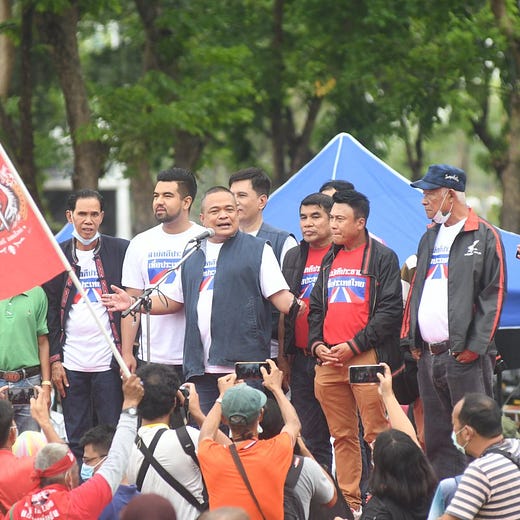
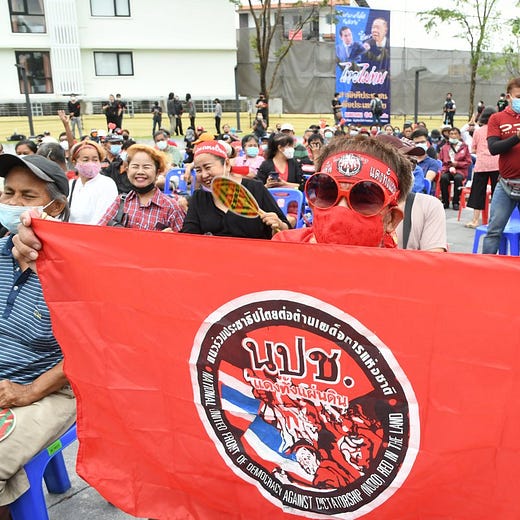
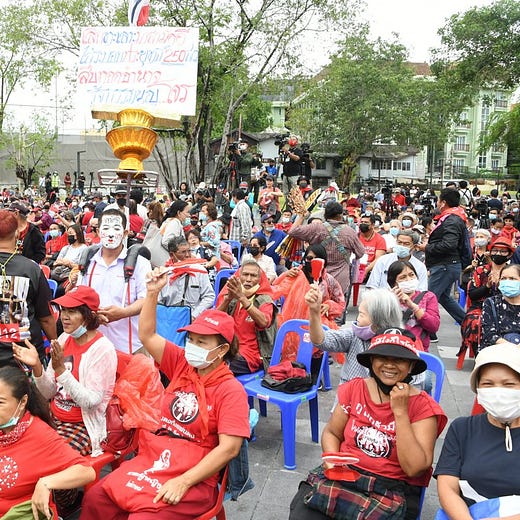
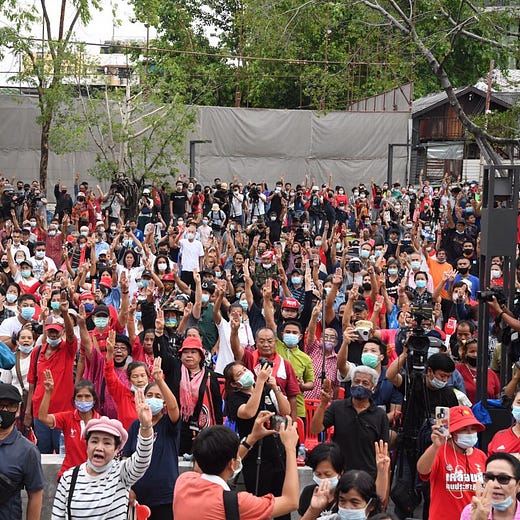
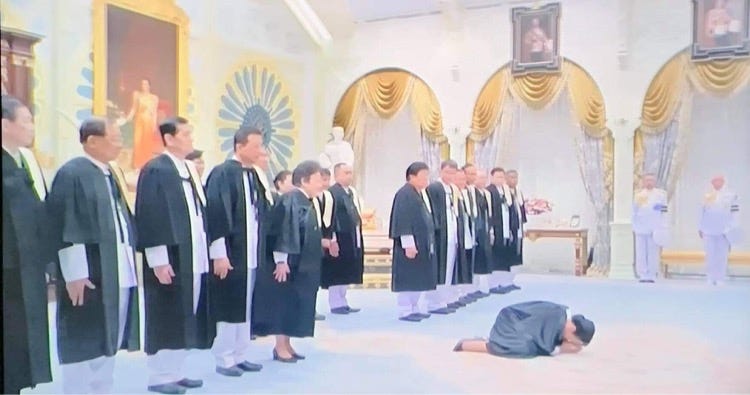





“Do they can make the different on this fight?”, “Did they wanna fight for democracy along with the students by really pure heart?” Now my answer to these two questions is “NO!” But maybe I’m wrong, so let see the situation from now on together..
For me personally, I don’t like Mr.Jatuporn very much and I think he and his ex-yellow shirt fellows are priceless and nothing more than opportunistic chameleons whose can betray anyone for their own benefits. Just like Rambo Esan but a little more clever, And I think the thai youths groups they’re looking the show of him today not really much different from me...😿❤️🌎👍